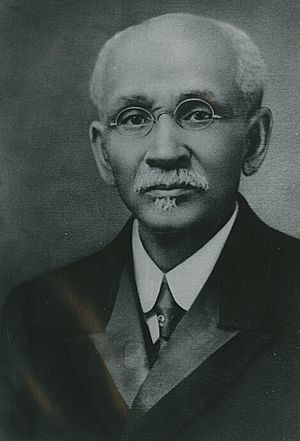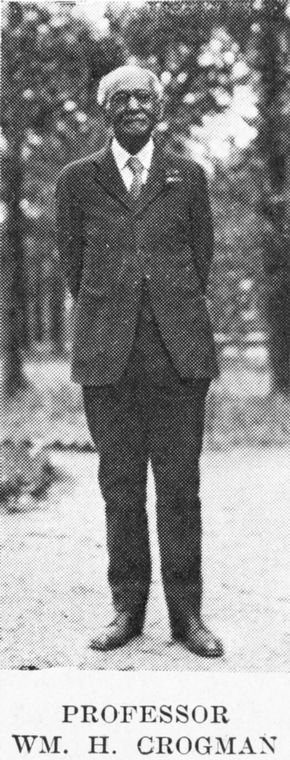William H. Crogman facts for kids
Quick facts for kids
William H. Crogman
|
|
|---|---|
 |
|
| Born | May 5, 1841 Philipsburg, Sint Maarten
|
| Died | October 16, 1931 (aged 90) |
| Alma mater | Atlanta University |
| Occupation | Professor |
| Signature | |
William H. Crogman (born May 5, 1841 – died October 16, 1931) was an important African American educator. He was a pioneer in teaching classic subjects like Greek and Latin. He taught at Clark University of Atlanta in the United States. A school in Atlanta, the William H Crogman School, is named after him.
Contents
Who Was William H. Crogman?
William Henry Crogman was born on May 5, 1841. His birthplace was Philipsburg, Sint Maarten. This is an island in the Dutch Caribbean. He became an orphan when he was 12 years old.
His Early Life and Learning
At age 14, William moved to the United States. He traveled with a man named B. L. Boomer. He went to schools in Massachusetts. He also had the chance to travel the world. He visited many ports in Asia, Europe, Australia, and South America.
After the American Civil War (1861-1865), he continued his studies. He attended Pierce Academy in Middleborough, Massachusetts. In 1870, he began teaching at Claflin University in Orangeburg, South Carolina.
After three years, in 1873, he joined Atlanta University. He was part of the first graduating class in 1876. Later, he became a professor at Clark University of Atlanta. He taught Greek and Latin there. Atlanta University gave him an honorary Doctor of Letters degree. This was the first time they gave this award. He also received an honorary Doctor of Laws degree.
Making a Difference: His Career
William H. Crogman was a very talented speaker. He gave many important speeches. In the early 1880s, he spoke to groups like the American Missionary Association. He also spoke to the Freedmen's Aid Society.
In 1883, he gave two speeches in Brooklyn, New York. These speeches were later printed as small books. In the mid-1880s, he attended a teachers' convention. This meeting was in Madison, Wisconsin. He also represented his church conference at a big Methodist meeting.
In 1884, he was chosen as the secretary for this conference. He was also picked to go to a worldwide Methodist meeting in London. In 1892, he joined a University Senate. This group helped decide what students needed to learn to get a college degree.
Leading Clark University
People at Clark University respected and loved him very much. He worked hard for equal education and civil rights. He often walked several miles to campus. This was because he refused to ride on segregated streetcars. For many years, he was the secretary of Clark's Board of Trustees. From 1903 to 1910, he served as the president of the school.
A Voice for Change
In 1895, he helped organize the Negro exhibit. This was for the Cotton Exposition in Atlanta. He was the main commissioner for African Americans from Georgia. He also served as a trustee at the Gammon Theological Seminary.
On March 5, 1897, he attended a special meeting. This meeting honored Frederick Douglass. It led to the creation of the American Negro Academy. Alexander Crummell led this new organization.
Later Years and Lasting Impact
Crogman retired in 1921. The Carnegie Foundation gave him a pension for life. He was married to Lavina Mott.
After retiring, he moved to Philadelphia. He lived with his daughter, Lottie Crogman Wright. Lottie was married to Richard R. Wright Jr.. Richard Wright was the president of Wilberforce University in Ohio. William Crogman had two other daughters, Edith and Ada.
William Crogman passed away in Kansas City, Missouri. This was on October 16, 1931. His wife died just a few days later. He was buried in Atlanta. Clark University built the beautiful gothic Crogman Chapel in his honor. The William H. Krogman Cottage is also named after him.
 | Lonnie Johnson |
 | Granville Woods |
 | Lewis Howard Latimer |
 | James West |


